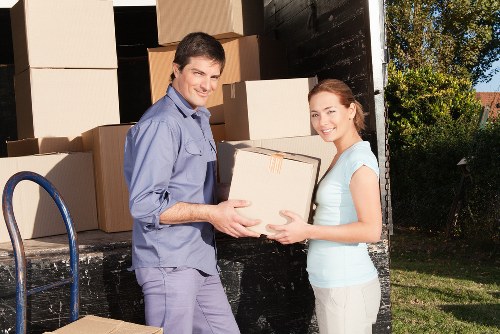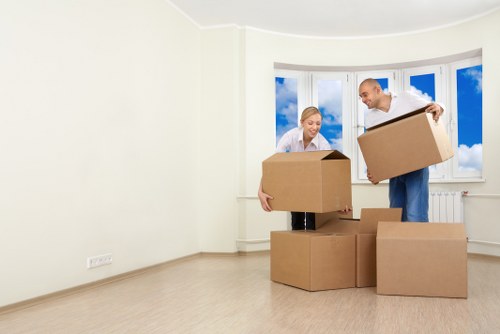Council Rubbish Collection North West London

Understanding Council Rubbish Collection
Living in North West London means having access to reliable council rubbish collection services. These services are essential for maintaining clean and healthy communities. The council is responsible for collecting household waste, recycling, and ensuring that rubbish is disposed of properly.
Proper rubbish collection helps reduce environmental impact and promotes recycling efforts. North West London councils work hard to provide efficient services that cater to the needs of residents.
In this article, we will explore the various aspects of council rubbish collection in North West London, including collection schedules, recycling programs, and tips for effective waste management.

Rubbish Collection Services Offered
North West London councils offer a range of rubbish collection services to accommodate different types of waste. These services include:
- Household Waste Collection: Regular collection of general household waste, including food scraps, packaging, and non-recyclable materials.
- Recycling Collection: Separate collection of recyclable materials such as paper, cardboard, glass, and plastics.
- Bulky Waste Collection: Scheduled collection of large items like furniture, appliances, and mattresses.
- Garden Waste Collection: Collection of green waste, including branches, leaves, and grass clippings.
- Hazardous Waste Collection: Safe disposal of hazardous materials like chemicals, batteries, and electronics.
These services ensure that different types of waste are managed appropriately, promoting sustainability and reducing landfill use.
Residents can easily access information about their specific rubbish collection services through their local council's website.

Collection Schedules and Procedures
Each council in North West London has its own rubbish collection schedule. It’s important to know your specific collection days to ensure your waste is collected on time.
Typically, general waste and recycling are collected on different days. For example, general waste might be collected on Tuesdays and recycling on Fridays. Bulky waste and garden waste often have separate schedules.
To find out your collection schedule, visit your local council’s website or contact their customer service. Remember to place your bins out the night before collection day and follow any specific guidelines provided by the council.

Recycling Programs in North West London
Recycling is a key component of the council rubbish collection services. North West London councils encourage residents to recycle by providing separate bins for different materials.
Commonly recycled items include:
- Paper and cardboard
- Glass bottles and jars
- Plastics marked with recycling symbols
- Metal cans and tins
- Electronic waste
Proper recycling helps conserve natural resources and reduces the amount of waste sent to landfills. Councils offer guidelines on how to sort your waste effectively to ensure maximum recycling efficiency.
Additionally, some councils organize recycling drives and provide extra services for hard-to-recycle items.

Managing Household Waste Effectively
Effective waste management starts with understanding what can and cannot be recycled. Here are some tips to help you manage your household waste:
- Sort Your Waste: Separate recyclables from general waste and place them in the appropriate bins.
- Reduce Waste: Minimize the amount of waste you produce by choosing reusable items and avoiding single-use plastics.
- Compost: Start a compost bin for organic waste like food scraps and garden waste.
- Proper Disposal: Dispose of hazardous waste and electronics through designated collection points.
- Educate Yourself: Stay informed about your local council’s waste management policies and participate in community recycling programs.
By following these steps, you can contribute to a cleaner and more sustainable North West London.
Remember, effective waste management not only benefits the environment but also enhances the quality of life in your community.

Benefits of Council Rubbish Collection
Council rubbish collection services offer numerous benefits to North West London residents. These include:
- Convenience: Regular and reliable waste collection services make it easy for residents to dispose of their waste without hassle.
- Environmental Protection: Proper waste management and recycling reduce pollution and conserve natural resources.
- Public Health: Keeping communities clean helps prevent the spread of diseases and pests.
- Aesthetic Appeal: Clean streets and neighborhoods enhance the overall appearance of the area.
- Community Well-being: A clean environment contributes to the well-being and happiness of residents.
These benefits highlight the importance of council rubbish collection services in maintaining a high quality of life in North West London.
Residents play a crucial role by adhering to collection schedules and participating in recycling programs.

Challenges Faced by Councils
Despite the benefits, council rubbish collection services face several challenges in North West London
- Increased Waste Volume: Growing populations lead to more waste, putting pressure on collection services.
- Recycling Contamination: Incorrect sorting of recyclables can contaminate entire batches, making them unsuitable for recycling.
- Funding Cuts: Budget constraints can affect the efficiency and frequency of waste collection services.
- Public Awareness: Ensuring that residents are informed and engaged in proper waste management practices is an ongoing challenge.
- Environmental Regulations: Keeping up with changing environmental laws requires continuous adaptation and improvement.
Addressing these challenges is essential for councils to maintain effective rubbish collection services.
Collaborative efforts between councils and residents can help overcome these obstacles.

Technology in Rubbish Collection
Technology plays a significant role in enhancing council rubbish collection services in North West London. Modern solutions include:
- Smart Bins: Equipped with sensors, smart bins can monitor waste levels and optimize collection routes.
- Mobile Apps: Apps provide residents with information on collection schedules, recycling guidelines, and the ability to report missed collections.
- Data Analytics: Analyzing waste collection data helps councils improve efficiency and plan better services.
- Automated Sorting Facilities: Advanced machinery aids in the accurate sorting of recyclable materials.
- Electric Collection Vehicles: Eco-friendly vehicles reduce the carbon footprint of waste collection operations.
Integrating these technologies not only improves service quality but also supports sustainability goals.
Councils continue to invest in innovative solutions to enhance their rubbish collection systems.

Community Involvement
Engaging the community is vital for the success of council rubbish collection services. Residents can participate in several ways:
- Recycling Programs: Join local recycling initiatives and ensure proper sorting of waste.
- Clean-Up Events: Participate in neighborhood clean-up activities to maintain a litter-free environment.
- Educational Workshops: Attend workshops to learn more about effective waste management and recycling practices.
- Feedback and Suggestions: Provide feedback to the council to help improve rubbish collection services.
- Volunteer Initiatives: Volunteer for community projects focused on waste reduction and environmental conservation.
Community involvement fosters a sense of responsibility and cooperation, leading to better waste management outcomes.
When residents actively participate, councils can implement more effective and tailored rubbish collection services.

Local Regulations and Policies
North West London councils have specific regulations and policies governing rubbish collection and waste management. These include:
- Waste Disposal Guidelines: Clear instructions on what can and cannot be disposed of through regular collection services.
- Recycling Mandates: Requirements for separating recyclables from general waste.
- Fines for Non-Compliance: Penalties for improper waste disposal or failing to adhere to collection schedules.
- Sustainability Targets: Goals to reduce waste, increase recycling rates, and minimize environmental impact.
- Resource Allocation: Budgeting and resource management to ensure efficient rubbish collection services.
Understanding these regulations helps residents comply with local laws and contribute to effective waste management.
Councils regularly update policies to address emerging waste management challenges and promote sustainability.

Costs and Funding
Funding for council rubbish collection services in North West London comes from various sources. These include:
- Local Taxes: Residents contribute through council tax, which helps fund waste collection and management services.
- Government Grants: Additional funding from national or regional governments supports environmental initiatives.
- Commercial Fees: Fees from businesses and commercial properties for waste collection services.
- Recycling Revenue: Income generated from selling recyclable materials to processing facilities.
- Private Partnerships: Collaborations with private companies to enhance waste management services.
Effective funding ensures that councils can maintain high-quality rubbish collection services and invest in sustainable waste management solutions.
Transparent financial management is crucial for building trust with residents and ensuring the longevity of waste collection programs.

Environmental Impact
Proper rubbish collection and waste management have a significant environmental impact. Key benefits include:
- Reduction in Landfill Use: Efficient waste collection minimizes the amount of rubbish sent to landfills.
- Conservation of Resources: Recycling preserves natural resources by reusing materials.
- Lower Carbon Footprint: Sustainable waste management practices reduce greenhouse gas emissions.
- Pollution Prevention: Proper disposal of hazardous waste prevents contamination of air, water, and soil.
- Biodiversity Preservation: Healthy environments support diverse plant and animal life.
Councils in North West London are committed to implementing environmentally friendly waste management practices to protect the planet.
Residents can contribute by following recycling guidelines and minimizing their waste production.

Future of Rubbish Collection
The future of council rubbish collection in North West London looks promising with ongoing advancements and initiatives:
- Increased Recycling Rates: Councils aim to enhance recycling programs to achieve higher recycling rates.
- Zero Waste Goals: Striving towards zero waste by reducing production and maximizing recycling and reuse.
- Technological Innovations: Incorporating more smart technologies to streamline waste collection and processing.
- Community Engagement: Strengthening community involvement to foster responsible waste management behaviors.
- Sustainable Practices: Adopting sustainable practices across all aspects of waste management to minimize environmental impact.
These initiatives will help North West London continue to lead in effective and sustainable rubbish collection services.
Embracing change and innovation is key to meeting future waste management challenges.
Areas Covered by North West London Councils
North West London encompasses several areas, each with its own unique characteristics and rubbish collection services. Here are some of the key areas covered:

1. Barnet
Barnet offers comprehensive rubbish collection services, including regular waste and recycling pickups. The area is known for its green spaces and community engagement in recycling programs.
2. Brent
Brent provides efficient rubbish collection with a strong emphasis on recycling and waste reduction. The council organizes numerous awareness campaigns to promote sustainable practices.
3. Ealing
Ealing’s rubbish collection services include household waste, recycling, and bulky waste management. The area boasts diverse communities actively participating in waste management initiatives.

4. Enfield
Enfield ensures timely rubbish collection services, focusing on both general waste and specialized recycling. The council supports various environmental projects to enhance waste management.
5. Harrow
Harrow offers robust rubbish collection services, including garden waste and hazardous material disposal. The council encourages residents to reduce waste through educational programs.
6. Hillingdon
Hillingdon’s waste collection includes regular pickups and recycling services. The area is committed to improving its waste management infrastructure with sustainable solutions.

7. Havering
Havering provides comprehensive rubbish collection, emphasizing recycling and eco-friendly disposal methods. The council actively promotes waste minimization strategies among residents.
8. Hounslow
Hounslow ensures efficient rubbish collection with a focus on reducing landfill dependency. The area supports various recycling initiatives and provides resources for proper waste sorting.
9. Kingston upon Thames
Kingston upon Thames offers extensive rubbish collection services, including household waste and recyclables. The council fosters community involvement in maintaining clean and sustainable environments.

10. Merton
Merton’s rubbish collection services include regular waste pickups, recycling, and bulky waste management. The council implements innovative waste management practices to enhance service efficiency.
11. Redbridge
Redbridge offers effective rubbish collection with a strong emphasis on recycling and waste reduction. The area is known for its proactive approach to environmental sustainability.
12. Richmond upon Thames
Richmond upon Thames provides high-quality rubbish collection services, focusing on maintaining the area's beautiful landscapes through effective waste management.

13. Sutton
Sutton ensures reliable rubbish collection services, including recycling and bulky waste disposal. The council actively engages with residents to promote sustainable waste practices.
14. Hammersmith and Fulham
Hammersmith and Fulham offer comprehensive rubbish collection services, emphasizing recycling and waste minimization. The area supports various community initiatives aimed at improving waste management.
Frequently Asked Questions
1. How can I find out my rubbish collection schedule in North West London?
You can find your rubbish collection schedule by visiting your local council’s website or contacting their customer service. Most councils provide online tools where you can enter your address to view your specific collection days.
2. What items are accepted in the recycling collection?
Recycling collection typically includes paper, cardboard, glass bottles and jars, plastics marked with recycling symbols, and metal cans. It’s important to follow your council’s guidelines to ensure proper sorting and avoid contamination.
3. How do I dispose of bulky waste in North West London?
Bulky waste can be disposed of by arranging a special collection with your local council. Visit your council’s website or contact their waste management department to schedule a pickup. Some councils also offer designated drop-off points for bulky items.
4. Are there any fees for rubbish collection services?
Rubbish collection services are typically funded through local taxes, such as council tax. However, there may be additional fees for special services like bulky waste collection or hazardous waste disposal. Check with your local council for specific details.
5. How can I reduce my household waste?
You can reduce your household waste by adopting practices such as recycling, composting organic waste, using reusable bags and containers, and minimizing the use of single-use plastics. Additionally, repairing items instead of discarding them and donating unwanted goods can significantly decrease the amount of waste you produce.